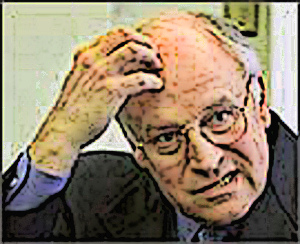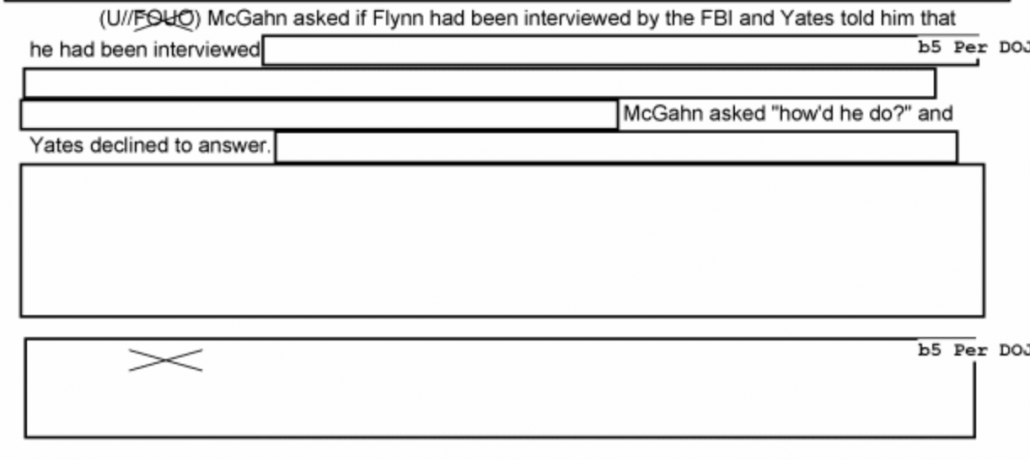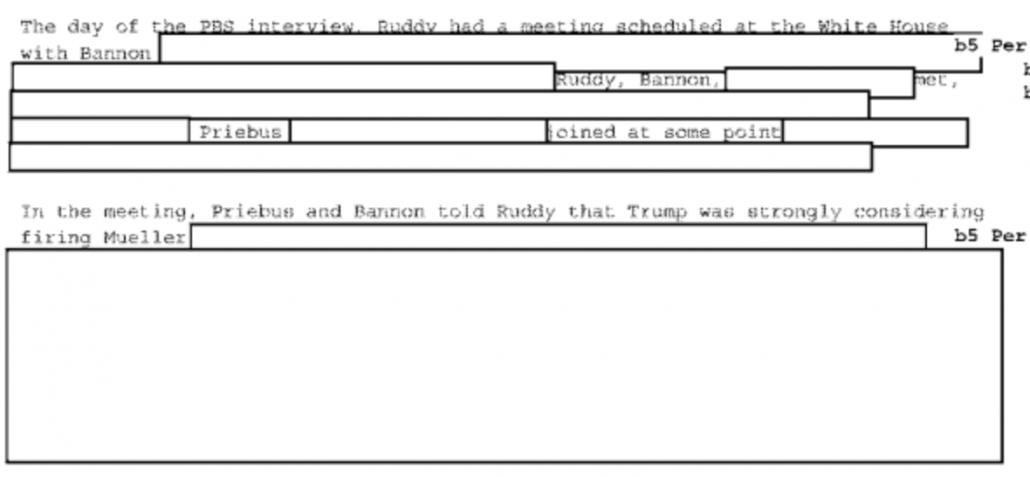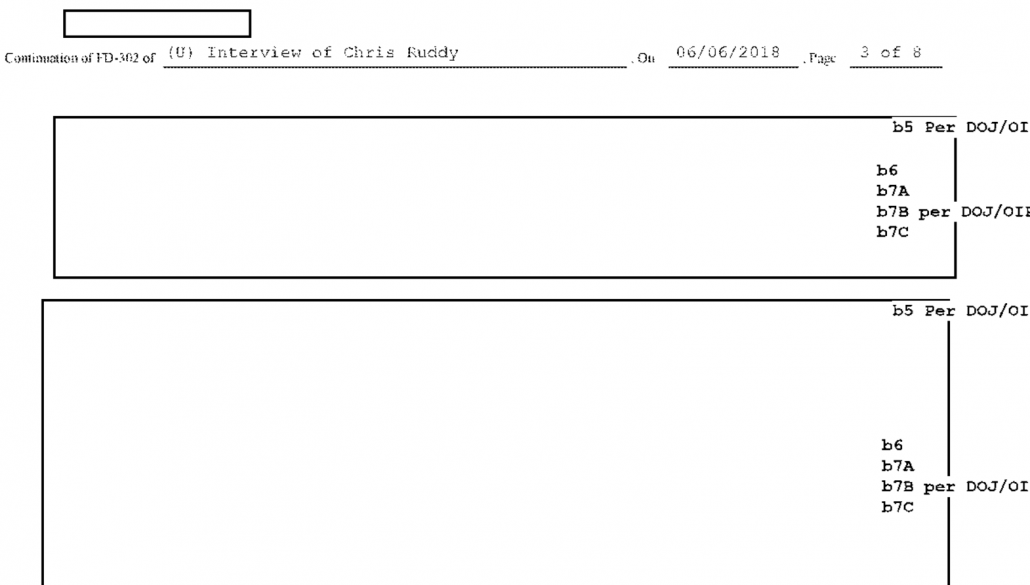“Problem:” SDNY Charges Elena Branson as Unregistered Agent of Russia
Back in 2013, the Senior Vice President of the Russian American Chamber of Commerce (Sergei Millian’s organization) sent Elena Branson language from FARA with the subject line, “Problem.”
a. On or about January 30, 2013, BRANSON received an email from an individual using an email address ending in “mail.ru.” Based on my review of publicly available information, I have learned that this individual was a Senior Vice President of the Russian American Chamber of Commerce in the USA. This email had the subject line “Problem.” and the text of the email included, among other things, a portion of the FARA Unit’s website with background on FARA. In response, BRANSON wrote, in part, “I am interested in the number of the law, its text in English[.]” The sender then responded with “Lena, read …” and copied into the email background on FARA and portions of the statute.
Branson, who the prior year had founded the Russian Center of New York and subsequently became the Chair of Russian Community Council of the USA (KSORS), apparently didn’t think it was an urgent problem. It wasn’t until 2019 that she appears to have considered — but then, after asking Russian Ambassador Anatoly Antonov for guidance, decided not to — register under FARA.
b. On or about December 10, 2019, BRANSON received an email indicating that BRANSON had requested a new FARA “eFile” account.21 That day, a member of the FARA Unit emailed the Branson RCNY Account with an eFile account number and temporary password to log in to the FARA eFile system. Later that day, a user logged in to the FARA eFile system using that account number and temporary password, and entered the registration name “Russian Center, Inc.” and the RCNY Office as the address. The user did not submit a FARA registration for the account. A user then accessed the account again on or about December 11, 2019, but, again, the individual did not submit a FARA registration. The internet protocol addresses connected to both log-ins of this account resolve to the same zip code as the RCNY Office.
c. On or about December 26, 2019, BRANSON emailed the Embassy Email Account. In the cover email, BRANSON wrote, in part, “[A] letter is in the attachment. Respectfully, Elena.” In the attached letter, BRANSON wrote, in part, that she had been asked questions from “compatriots” about “whether it is necessary to register their public organizations as a foreign agent.” BRANSON further wrote “[t]hese questions began to arise after the arrest of Maria Butina in Washington in July 2018 on charges of working as a foreign agent in the United States without registration.” BRANSON concluded the letter by asking the Embassy to advise such Russian compatriot groups, writing, “I am asking you to provide legal advice regarding registration as a foreign agent . . . for public organizations of Russian compatriots in the United States.” The letter was addressed to Ambassador-1.
Branson’s failure to register lies at the core of a 6-count complaint unveiled by SDNY yesterday, charging Branson in several conspiracies, under both FARA and 18 USC 951, as well as for visa fraud.
Branson won’t be arrested off this complaint. She’s long gone.
A month after the FBI interviewed her and searched her office in September 2020, she fled the country. Not long after Biden was inaugurated, Branson sold her NYC apartment.
During this investigation, the FBI has, among other things, executed judicially authorized search warrants for (i) approximately eight of BRANSON’s electronic accounts (the “Branson Accounts”3); (ii) the RCNY office (which was also BRANSON’s residence) in Manhattan, New York (the “RCNY Office”); and (iii) BRANSON’s person, for all electronics and other materials in her possession at the time of the search. From the RCNY Office and the search of BRANSON’s person, the FBI recovered a total of approximately 34 electronic devices (the “Branson Electronics”), including approximately 11 cellular phones. The FBI also conducted a voluntary interview of BRANSON on the same day as the search of the RCNY Office (the “Branson Interview”) and has interviewed other individuals living in the United States in connection with the investigation.
The searches of the RCNY Office (the “RCNY Search”) and BRANSON’s person, as well as the Branson Interview, took place on or about September 29, 2020. BRANSON flew to Moscow, Russia, on or about October 20, 2020, and BRANSON does not appear to have returned to the United States since that date. In or about March 2021, BRANSON sold the RCNY Office, which had been her residence in New York City. During in or about October and November 2020, BRANSON’s then boyfriend 9 (“Boyfriend-1”) wired approximately $197,000 to two of BRANSON’s bank accounts at Russian banks.4 On or about October 15, 2021, RT, formerly known as Russia Today, a Russian state-controlled television station, published an interview conducted by Maria Butina5 of BRANSON. During this interview, BRANSON told Butina, in substance and in part, that BRANSON left the United States for Moscow approximately one month after the Branson Interview because BRANSON was “scared” and thought the “probability was very high” that she would be arrested if she stayed in the United States.6
3 The Branson Accounts include four email accounts and four social media accounts, including BRANSON’s Facebook account (the “Branson Facebook Account”).
So Branson will only be arrested if she decides to flee Putin’s increasingly totalitarian regime.
Unlike the prosecution of Jack Hanick, then, whose indictment may have been timed to tolling statutes of limitation last November and in which the US is working on getting him extradited from the UK, this complaint seems to be more about messaging in the wake of the Russian invasion of Ukraine.
As a messaging vehicle, it shows how Russia has committed to the “consolidation” of Russian diaspora, cultivating a Russian identity that can be used to mobilize political pressure (and, in Ukraine and the Baltics, justifications for imperialism).
In or about November 2015, Lavrov published an article titled “Russian World: Steering Towards Consolidation.” In this article, Lavrov wrote, in part, “The provision of support to the Russian world is an unconditional foreign-policy priority for Russia, as formalized by Russia’s Foreign Policy Concept. . . . Over the years, we have managed to elevate our work in this area to an entirely new level and to create effective cooperation mechanisms in close contact with representatives of foreign communities.”
Some of Branson’s activities are mundane cultural exchanges paid for by Russian government entities. Some sprinkle the names of likely spies or handlers in the description.
Perhaps most interesting, the complaint provides an interesting addition to this passage from the Mueller Report.
Later [on November 9, 2016, the day after Trump’s victory, Kirill] Dmitriev flew to New York, where Peskov was separately traveling to attend the chess tournament. 1020 Dmitriev invited Nader to the opening of the tournament and noted that, if there was “a chance to see anyone key from Trump camp,” he “would love to start building for the future.” 1021 Dmitriev also asked Nader to invite Kushner to the event so that he (Dmitriev) could meet him. 1022 Nader did not pass along Dmitriev’s invitation to anyone connected with the incoming Administration. 1023 Although one World Chess Federation official recalled hearing from an attendee that President-Elect Trump had stopped by the tournament, the investigation did not establish that Trump or any Campaign or Transition Team official attended the event. 1024 And the President’s written answers denied that he had. 1025
The complaint describes how Branson had been instructed to arrange a meeting with Trump or Ivanka in March 2016, around the same time Russia was hacking John Podesta, though the complaint is remarkably coy about whether Branson ever sent her draft letter to Trump Organization (and if so, whether it was among the documents showing direct ties to Russia that Trump Organization withheld from Mueller’s inquiry and SSCI).
In or about March 2016, BRANSON exchanged a series of emails with Minister-2. During these messages, in part, Minister-2 asked BRANSON to organize a meeting with CC-2 and the now-former President of the United States, who was then a candidate for the Republican presidential nomination, or his daughter, in New York. On or about March 23, 2016, BRANSON received an email from Minister-2 with the subject line “additional meetings of [CC-2].” The email stated, in part, that the author was requesting BRANSON’s assistance in organizing meetings for CC-2 with “the management” of certain specified U.S. companies. On or about March 16, 2016, BRANSON sent an individual, who was then-chair of KSORS, a draft letter addressed to the now-former President, inviting him to the Russia Forum New York in April 2016 and suggesting that if his “busy schedule will not permit your attending our forum, perhaps you can suggest one of your children . . . who have followed in your footsteps.” The draft invitation included BRANSON’s name and contact information in the signature block. There is no indication that the now-former President or his children attended the referenced meeting.
Branson’s complaint describes what would be a second attempt to get Trump to attend the Chess Championship, in addition to Kirill’s attempt to extend an invite through George Nader. Branson sent her invite to an unnamed Trump Advisor.
BRANSON also attempted to arrange meetings for Russian officials at the 2016 World Chess Championship, which was held in Manhattan, New York:
1. On or about November 9, 2016, CC-6 emailed BRANSON with the subject line “Chess business.” CC-6 wrote to BRANSON, in part, “as discussed we will try to get Kirsan online after tomorrow’s official press-conference is over around noon at Fulton Street Market Building, South Street Seaport NY[.]”20 On or about that same day, BRANSON responded to CC-6 and wrote “[CC-6], good evening! I can bring the ipad for a Skype session. I will contact the media. Need them at noon?”
2. On or about November 10, 2016, BRANSON emailed an advisor to the now-former President of the United States (“Advisor-1”), expressing congratulations for their victory in the presidential election and attaching an invitation to the World Chess Championship addressed to the then-President- elect. The invitation was signed by “President of the International Chess Federation (FIDE-FIDE).” There is no indication that the now-former President attended the referenced event.
3. On or about November 11, 2016, BRANSON was photographed at the World Chess Championship with CC-6 and a second individual who I recognize, based on my review of publicly available photographs, to be the current Press Secretary for Russian President Vladimir Putin.
20 Based on my training and experience, including my review of publicly available material, I have learned that Kirsan Ilyumzhinov is the former President of the Republic of Kalmykia in the Russian Federation and the former president of FIDE, the International Chess Federation. I have further learned that, on or about November 25, 2015, the United States Department of the Treasury designated Ilyumzhinov as a Specially Designated National for his involvement with the Government of Syria and related entities.
Here, the complaint reiterates the Mueller conclusion: there’s no evidence Trump attended the event. But it does raise questions about the completeness of the response Trump offered to Mueller’s questions, pertaining to whether Trump was asked to attend.
Were you asked to attend the World Chess Championship gala on November 10, 2016? If yes, who asked you to attend, when were you asked, and what were you told about about [sic] why your presence was requested? 1. Did you attend any part of the event? If yes, describe any interactions you had with any Russians or representatives of the Russian government at the event.
Were you asked to attend the World Chess Championship gala on November 10, 2016? If yes, who asked you to attend, when were you asked, and what were you told about about [sic] why your presence was requested? 1. Did you attend any part of the event? If yes, describe any interactions you had with any Russians or representatives of the Russian government at the event.
Response to Question V, Part (a)
I do not remember having been asked to attend the World Chess Championship gala, and I did not attend the event. During the course of preparing to respond to these questions, I have become aware of documents indicating that in March of 2016, the president of the World Chess Federation invited the Trump Organization to host, at Trump Tower, the 2016 World Chess Championship Match to be held in New York in November 2016. I have also become aware that in November 2016, there were press inquiries to my staff regarding whether I had plans to attend the tournament, which was not being held at Trump Tower. I understand these documents have already been provided to you.
Trump describes a March 2016 discussion about hosting the event and November press inquiries about whether he would attend it. But there’s no mention of a November 2016 invitation asking him to attend.
Yet the Branson complaint suggests there would have been an invitation to Trump, signed by the sanctioned Kirsan Ilyumzhinov, sent through an unnamed advisor. His response reflects only earlier (in March) communications about the chess championship, not anything sent on November 10 bearing Ilyumzhinov’s signature.
This is a signaling complaint, one that likely won’t lead to anyone’s arrest. But it should raise more questions about Donald Trump’s candor with Mueller back in 2018.
And we should expect more of the same. On Twitter, Brandon Van Grack, who would have been involved in Branson’s investigation when he ran the National Security Division’s FARA office and likely knows what else might be in the pipeline, suggested there’s probably more of the same to come.














